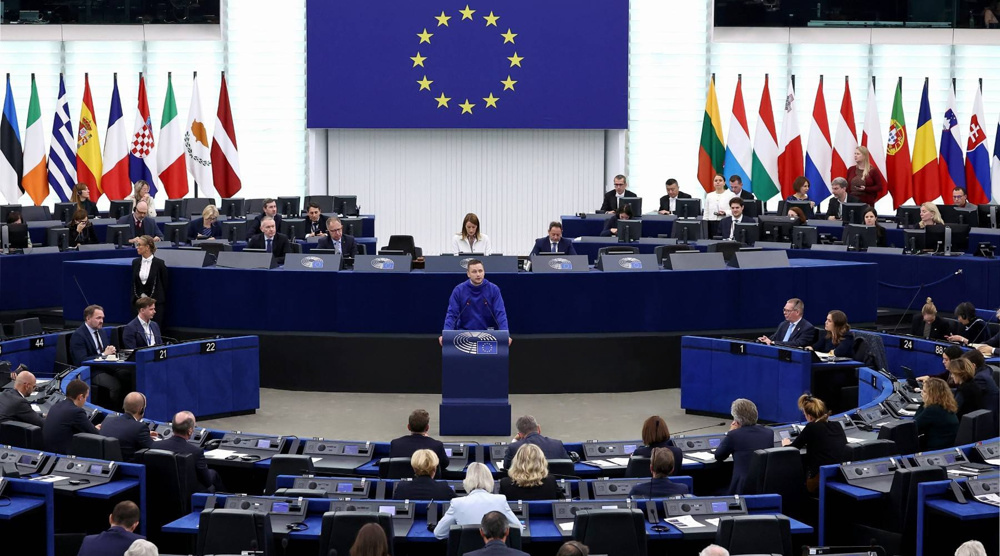Greece urges dignified breakthrough in debt row with Eurogroup
Greek Prime Minister Alexis Tsipras has called for a breakthrough in a row over a recent decision by the Eurogroup, the body of 19 finance ministers from the eurozone, to halt a debt relief initiative for Greece.
“I believe that we can have a breakthrough without blackmail and with respect of the sovereignty of each country,” Tsipras said Thursday as he arrived for a European Union summit in Brussels, Belgium.
Tsipras’s remarks came after eurozone ministers decided to suspend a series of debt relief measures granted to Greece in response to an announcement of extra spending on pensions and other programs by Athens.
The Eurogroup said earlier on Wednesday that Greece’s plan to implement a one-off payout to 1.6 million pensioners, along with a sales tax break for islands sheltering refugees, was inconsistent with previous agreements between Tsipras’s leftist government and creditors.

Tsipras said, however, that the fresh row made it necessary for both Greece and creditors to reach a fair solution to long-standing disputes over how Athens could continue to benefit from its international bailout while maintaining its dignity and sovereignty.
“For the Greek issue, I believe that now it's time to have a breakthrough. I will have a chance to discuss with a lot of my colleagues," he said before the EU summit.
Other EU governments have also defended Greece’s right to steer its finances. French President Francois Hollande, who is also in Brussels, said that Greece should be treated with “dignity.”
“I want Greece to be treated with dignity and to stay in the eurozone," Hollande said Thursday, adding, “There cannot be any question of asking extra efforts from Greece or of stopping it from taking a certain number of sovereign decisions.”
French Finance Minister Michel Sapin also elaborated that Paris was opposed to the Eurogroup’s decision to suspend the debt relief measures, saying the move came without the full approval of the members of the 19-nation group.
“Individual statements are not the collective statements of the eurogroup,” Sapin said Thursday, clearly making a reference to Germany’s reported push for suspension of the debt relief.

Germany has been very tough on Athens since the debt-wracked country managed to secure its third bailout in July 2015, after months of breathtaking negotiations that nearly saw Greece’s cash out of the euro.
Berlin has even called on Athens to continue implementing painful spending cuts beyond 2018 as part of reforms aimed at securing the international funds. Tsipras has rejected any austerity measures beyond 2018.
The International Monetary Fund (IMF), one of Greece’s three creditors, has been criticizing the EU lenders over the past months for their treatment of Greece, saying the creditors have failed to get Greece back on its feet.
Under IMF pressure, the German-led Eurogroup allowed Athens to have debts relief measures last week but then changed its mind when Tsipras announced the extra spending for 2017. Greece’s debt is estimated to reach whopping figures above USD 330 billion this year.
Trump threatens 200% wine tariffs on France to push Macron to join Gaza board
Yemen’s Saudi-backed PLC slams UAE for running secret prisons; Abu Dhabi denies
Swiss MPs move to strip UEFA of tax-exempt status over failure to ban Israeli teams
VIDEO | Massive Michigan pileup sees over 100 vehicles collide in highway crash
Diagnosing the roots of Iran’s economic turmoil
VIDEO | Press TV's news headlines
Son of Iran’s deposed Shah urges US, Israel to bomb country after failed ‘regime change’ plot
Jan. 12, 2026 – the day Iranians again rallied to reject hostile plots against Islamic Republic













 This makes it easy to access the Press TV website
This makes it easy to access the Press TV website